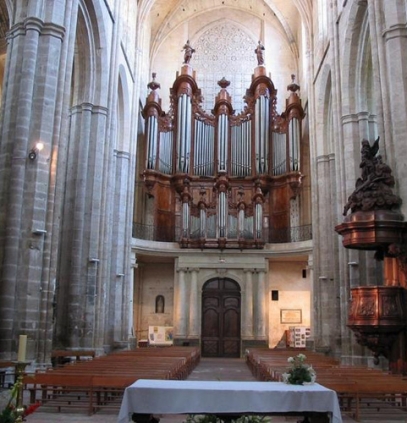

Saint-Maximin-la Sainte-Baume (Var),
Basilique Sainte-Marie-Madeleine

Jean-Esprit and Joseph Isnard 1772-74
State of preservation: Largely original. Modern key action (1987). Obviously some alteration occured while the organ was built. A later retuning to equal temperament was reversed in 1991.
Jean-Esprit Isnard's organ is in some ways exceptional among the extant French organs of the 18th century. The standard elements of a French organ are shaped in a peculiar way: The number of diapason and reed stops as well as the cornets is enlarged above average. The pedal is only an attached aid primarily for realising cantus firmus parts.A further peculiarity is the presence of two treble trumpet stops "en chamade" with horizontal resonators, common usually beyond the Pyrenees.
During the 19th century new bellows and keyboards with widened compasses and modernised tuning were installed, and in 1927 electric blowers. In 1953 the organ has been classified a „Monument historique".In 1987-1991 the restoration by Manufacture provençale d'orgues ä Carces (Var) under M. Yves Cabourdin replaced the changes and reestablished unequal temperature.
Music sample
Jean-Jacques Beauvarlet-Charpentier (1734-1794): Grand Choeur
played by Nicolas Gorenstein
Specification
IV+aP; manuals C, D-d3, pedal C’-g1
Grand Orgue:
Montre 16’
Bourdon 16’
Montre 8’
Bourdon 8’
Dessus de Cornet [8’] 5f.
Prestant 4’
Double Nazard 5 1/3’
Double Tierce 3 1/5’
Grande Fourniture 2f.
Petite Fourniture 4f.
Cymbale 4f.
Trompette 8’
Dessus de Trompette 8’ („en chamade“)
Voix humaine 8’
Clairon 4’
Positif:
Montre 8’
Bourdon 8’
Flûte 8’
Dessus de Cornet [8’] 5f.
Prestant 4’
Nazard 2 2/3’
Doublette 2’
Quarte 2’
Tierce 1 3/5’
Larigot 1 1/3’
Fourniture 3f.
Cymbale 3f.
Trompette 8’
Cromorne 8’
Clairon 4’
Rèsonance:
Flûte (P) 16’
Flûte (P) 8’
Dessus de Flûte 8’
Dessus de Cornet [8’]
Flûte (P) 4’
1ère Trompette (P) 8’
2è Trompette (P) 8’
Dessus de Trompette 8’ („en chamade“)
Clairon (P) 4’
(The stops marked „P“ are also attaced to the pedal)
Récit:
Cornet [8’] 5f.
Trompette 8’
Hautbois 8’
Couplers Pos/GO; Rès/GO; Tremblant doux
P attached to Rèsonance
© Greifenberger Institut für Musikinstrumentenkunde | info@greifenberger-institut.de



